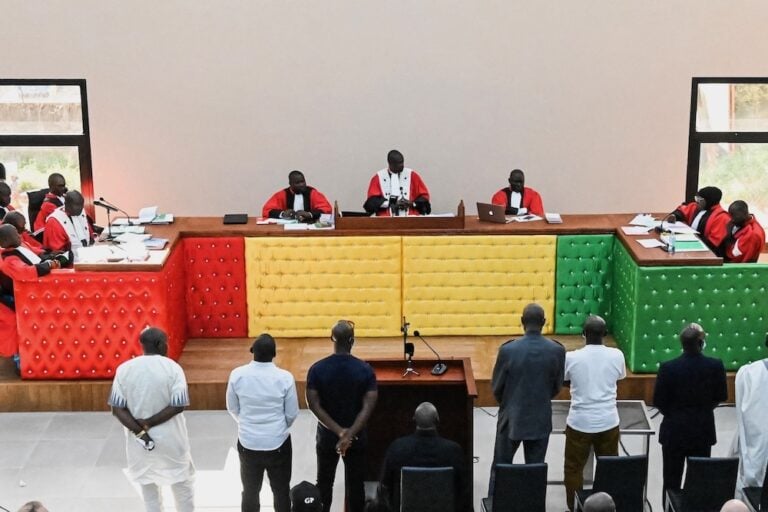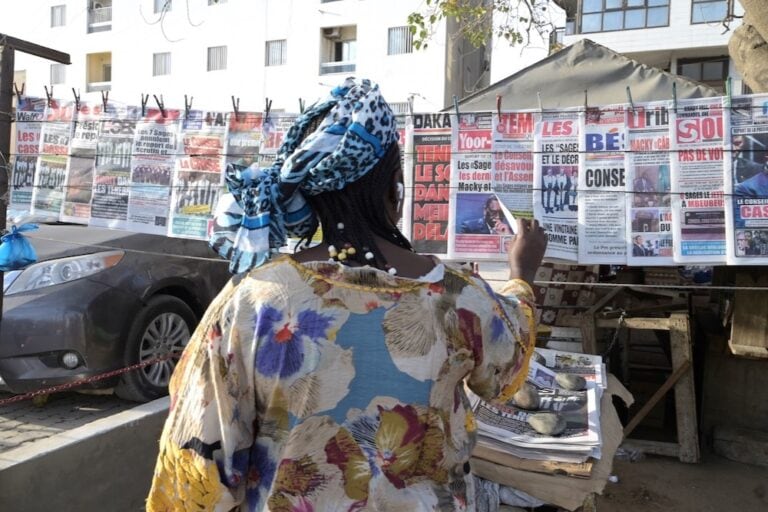(CPJ/IFEX) – The following is a 15 March 2007 CPJ press release: In Senegal, journalists given suspended prison term and heavy fine New York, March 15, 2007 – A court in the capital Dakar has sentenced two journalists to suspended prison terms and heavy damages on criminal defamation charges related to a June 2006 story […]
(CPJ/IFEX) – The following is a 15 March 2007 CPJ press release:
In Senegal, journalists given suspended prison term and heavy fine
New York, March 15, 2007 – A court in the capital Dakar has sentenced two journalists to suspended prison terms and heavy damages on criminal defamation charges related to a June 2006 story on a consumer complaint against a car dealership, according to local journalists and news reports.
Director Jean Meïssa Diop and reporter Faydy Dramé of Walf Grand-Place, a daily publication of leading independent Wal Fadjri media group, were each sentenced on March 8 to six-month suspended prison terms and 10 millions CFA francs (US$21,000) in damages, defense lawyer Ndéné Ndiaye told CPJ. They are free pending an appeal, he said.
The ruling stemmed from a complaint filed by Matforce, a local Hyundai car dealership, in connection with two articles relating a dispute between a business executive and Matforce over the sale of allegedly defective vehicles, Diop told CPJ. The June 10-11, 2006 articles, respectively entitled “Feeling swindled in a car sale, Technobase/Alcom group will sue Matforce ( . . . )” and “Rebuttal to complainants: dealer denounces blackmail ( . . . )” were published on the same page, according to CPJ research. Matforce alleged it was defamed by comments of the business executive, Diop said.
“CPJ calls on the appeals court to overturn the criminal convictions and prison sentences of Jean Meïssa Diop and Faydy Dramé,” said CPJ Executive Director Joel Simon. “We urge President Abdoulaye Wade to honor his pledge to decriminalize defamation. Journalists should not be imprisoned for what they write.”
“How can we be accused of defamation when, alongside the interview of the complainant, we published responses to the allegations from three company officials,” Diop told CPJ. The journalists requested that Matforce refer the incriminating articles to the Council for the Respect of Professional Ethics, an advisory body known by its French acronym as CRED, according to Alpha Sall, former secretary-general of the Senegalese Syndicate of Information and Communication Professionals.
Despite a 2004 pledge by Wade to ban criminal sanctions for press offenses, authorities continued to sentence several journalists under a provision of the Senegalese penal code, according to CPJ research.
In a pending criminal defamation suit, presidential lawyer Ousmane Sèye was expected to request 500 million CFA francs (US$1 million) in damages against director Mamadou Biaye and reporter Ndiaga Ndiaye of the private daily Le Quotidien over a March 8 article critical of Sèye, according to private daily L’Observateur. During last month’s presidential campaign, Wade was quoted as saying that his only serious challengers were “a part of the press,” according to Agence France-Presse.
CPJ is a New York-based, independent, nonprofit organization that works to safeguard press freedom worldwide. For more information, visit http://www.cpj.org


